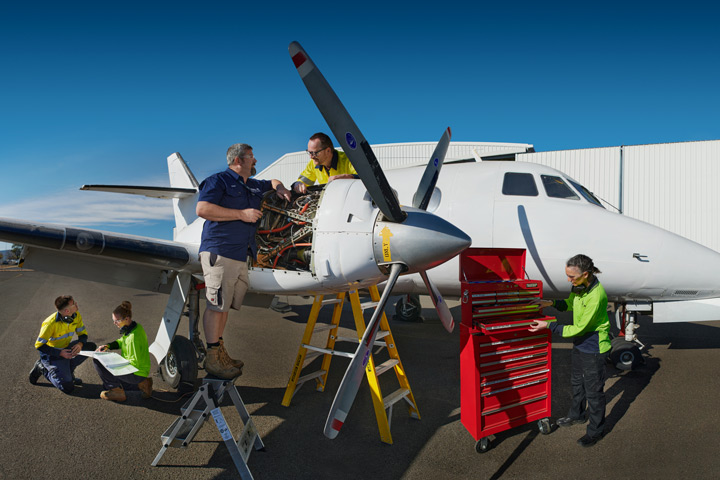- Go to homepage
- Course areas
- Aviation and Aircraft Maintenance
- Certificate II in Aeroskills

About this course
Launch your studies in the avionics industry and learn the entry-level skills needed in aviation maintenance workshops. Gain insight from industry-experienced teachers to ensure planes fly smoothly and safely, and have the opportunity to achieve credits towards higher level qualifications.
What you'll gain
Learning outcomes
Through a mixture of theory and practical course work, learn to:
Work on aircraft to remove, install, inspect and test various systems and mechanical components
Interpret aviation maintenance manuals
Complete repairs on limited structural components
Work safely and sustainably in an aviation maintenance environment
Fabricate aircraft electrical looms and harnesses
Course outcomes
Gain practical experience and develop specialist skills that give you an advantage in the job market.
Experience working on real aircraft components at your TAFE NSW campus
Skills to work safely and sustainably in the industry
Industry experience working with a variety of aircraft
Strong pathways to continue your studies and enhance your career opportunities
Is this course right for you?
Entry requirements
Some courses require evidence of previous experience or study before you can enrol.
- There are no entry requirements for this qualification. You can enrol today.
Completion requirements
During your study you’ll need to provide your teacher with the following evidence:
Entry recommendations
To be prepared for this course, we recommend that you have:
English and maths skills at a Year 10 or equivalent level
The ability to work as part of a team
Spatial awareness and hand-eye coordination
Some experience in handling tools and equipment
We tailor our courses to meet local community needs, so some campuses may have extra entry requirements. Check your preferred location for details. Need help preparing? Contact us for support.
Find Your Fit
This simple tool guides you to a suitable course level based on your foundation skills and confidence.
Future career and study options
Career pathways
Our graduates go onto roles like:
Aircraft Maintenance Engineer (Avionics)
Aircraft Maintenance Engineers (Avionics) inspect, test, align, repair and install aircraft electrical and avionic system components.
Full-time share Full-time workers usually work 35 hours or more a week (in all their jobs combined).
97%
Employment size Employment size is the number of workers who do this as their main job.
1,400 workers
Average age This is the average age of all workers in this job.
33 years
Weekly pay Median earnings are shown for full-time, non-managerial employees paid at the adult rate, before tax or any amounts that are salary sacrificed. These figures are a guide to earnings only and should not be used to determine a wage rate.
$1,600
Average full-time The average full-time hours that people in this role work each week.
43 hours
Skill level rating Skill level ratings are based on the range and complexity of job roles. In general, the higher the skill level, the more formal education and training, previous experience or on-the-job training needed to be good at the job.
Medium
Gender share
5% female
Future growth The Department of Employment, Skills, Small and Family Business estimates the likely change in number of workers in this role, or industry, over the next 5 years. Future growth is the likely percentage change compared to all other job roles.
Stable
Other jobs include: Aircraft line maintenance worker, Aircraft maintenance engineer (structures), Aircraft maintenance engineer (mechanical) and Aircraft maintenance engineer (avionics)
Study pathways
Take your study further with other courses offered at TAFE NSW:
Previous study0 Courses
Begin here to gain experience and confidence in this study area.
The Certificate II in Aeroskills does not have any pre-requisite courses.
Further study4 Courses
Advance your skills to take your career to the next level
Related study0 Courses
Strengthen your expertise and gain specialist skills to expand your employability.
The Certificate II in Aeroskills does not have any related courses.
Your experience counts
At TAFE NSW, we recognise your previous study and work experience. You can apply for recognition of prior learning or a credit transfer with any of our courses. If you're successful you'll get your qualification faster.
Units taught in this course
Courses are made up of a combination of both core and specialty units. In the Certificate II in Aeroskills qualification, you’ll need to successfully complete 12 Units of competency, including 8 core and 4 speciality units.
Please note, not all specialty units are offered at every TAFE NSW location. It is highly recommended that you check with your preferred campus for information about the specialty units offered at that location.
Core units are central to the job outcomes of a particular industry or occupation. These are the units industry has agreed are essential to be capable and qualified at a particular study level.
Perform basic hand skills, standard trade practices and fundamentals in aviation maintenanceMEA158
Apply work health and safety practices in aviation maintenanceMEA154
Interpret and use aviation maintenance industry manuals and specificationsMEA107
Participate in environmentally sustainable work practicesMSMENV272
Facilities and support
TAFE NSW provides support services across all campus locations and online. Whatever your needs or circumstances, we have the people, resources, counselling and facilities to support you in focusing on your studies.
TAFE NSW Disability Support Service
TAFE NSW Language, Literacy and Numeracy (LLN) support
TAFE NSW Aboriginal Support; Learner support (ABE)
TAFE NSW Careers, Counselling and Pathways Service
TAFE NSW Libraries
Scholarship programs - be supported as you explore your talents and fulfil your potential
Read&Write literacy and study support software is available free for all TAFE NSW students to use while studying on campus and at home
LinkedIn Learning - an online resource which offers innovative courses and tutorials to improve your personal and professional skills
Student associations - get social with our student community